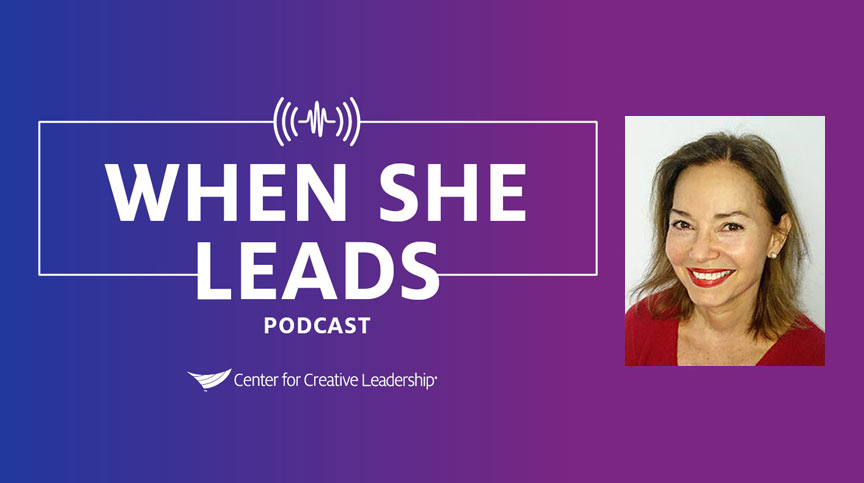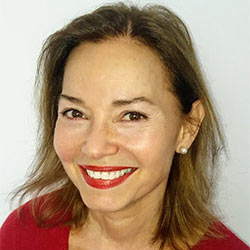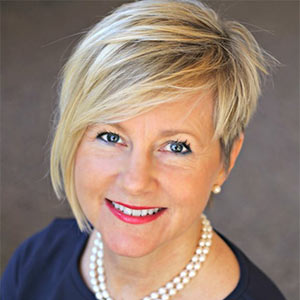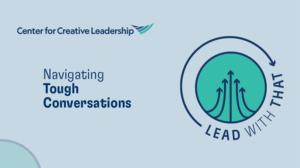- PODCAST
When She Leads: Trailblazing Leadership, From Spain to Peru

In this episode of When She Leads, our women in business podcast, we speak with Marta Del Rio Villaneuva, who has been honored by the United Nations for her work. Marta explains to host Laura Santana how she has successfully retained talented women in the workplace, especially millennial women; the societal expectations of women and girls in traditional Latin American cultures; her involvement with the 30/30 initiative (to have 30% of major companies in Peru staffed by women by 2030); and how the pillars of training, networking, and engaging men are moving the country towards this goal. Listen now or read the full transcript, below.
Listen to the Podcast
In this episode of When She Leads, Marta Del Rio Villaneuva discusses challenges faced by women in business in traditional Latin American cultures. Listen now.
“Millennials — in general, all over the world — they jump from one job to another, like 6 months, a year, 2 tops. In our case, we have people that last 3 years and counting because no one is leaving.”
Marta del Rio Villanueva
Co-Founder & CEO
Wasi Organics
Interview Transcript
INTRO:
Welcome to When She Leads, a podcast from the Center for Creative Leadership that showcases the power of women in the workplace. We’re sharing stories of inspiration and impact from executives in a range of industries and organizations around the world. These are people who are making a difference by supporting women’s advancement and development…Because we believe when she leads, it’s ultimately about better outcomes for all.
HOST, Laura Santana:
Hello. This is Laura Santana. I am a global faculty at the Center for Creative Leadership, and today it is my privilege and my honor to speak with Marta Del Rio. Marta is honored by the United Nations as one of 5 empowered women international honorees. She’s hosted by the Council of Women World Leaders with the U.N. Secretary General, and she’s actually founder and president of her own organization, named Wasi. What’s unique about Marta’s business is she sources from small Andean farmer associations. She pays fair prices and she promotes health and wellbeing, while eradicating poverty in the Andes. She’s based in Peru but has global operations.
Marta, I am so excited to learn about you and to have you share part of your story with us. Can you tell us a little bit about your role in the organization?
GUEST, Marta Del Rio Villaneuva:
Thank you. Thank you for inviting me. I’m really thrilled to be here. Laura, as a very small organization startup, because ours is a 4-year-old organization, the COO is of course officially the COO, but we have different hats. The first of course COO and founder. The second, and not less important, head of human development. The third, head of marketing and international expansion. And then I am the main strategist in the company, and I also take care of funding and investor relations. My partner is the CEO and she takes care of all the operation outside of the business, mainly production, plant, and supply.
Laura Santana:
Thank you. As I listen to all the roles that you have, I’m wondering how you see the challenges that women in your organization or in the industry face? Can you talk to us about those challenges a bit?
Marta Del Rio Villaneuva:
Yeah, of course. I was thinking about that. I’ve been thinking about that for a long time, and there aren’t really big differences between industries. In terms of the challenges that women face it’s probably more about the intensity of each of the challenges, but in general we all share the same difficulties. I would say that the fact that we are in a Latin American country, and in a developing country makes it probably more intense even because of the cultural side of it.
In Peru, even millennials, even women that we believe have much more opportunities because they have been now leaving university at the same pace as men. But here, you leave university as a woman, and they still expect you to get married and have children and to of course have a job. But men will take care of between 10% and 15% of the household duties, while women, on top of the workload, would have to take on at least 80% or 90% of that. So things haven’t really changed much in the last, I don’t know, 20 or 30 years.
Laura Santana:
That’s so interesting. I am always struck by the cultural expectations of gender really guiding a lot of how people follow a path. I’m curious how you got interested in women’s leadership or in being a woman leader yourself. Can you talk to us about that?
Marta Del Rio Villaneuva:
Yeah, this has been a very long journey. Having been raised in Peru, where cultural background is very strong in terms of what you are supposed and not supposed to do as a woman, so nobody really told me, except probably my mother who was a little bit ahead of her time, but still the typical housewife. She always told me that I should try to do things differently.
I just felt that I needed to prove that we could do the same. So my way of proving that was to start in university with the most difficult career, and the one that only men were involved, which was industrial engineering. So when they asked me, “Why are you studying this?” I had to sort of like, you know evade the question, because I didn’t want to tell them exactly why I was studying that. And the reason was because I wanted to prove that any woman could do exactly the same, exactly as well in industrial engineering as a man. And so I did that for a couple of years. I realized I didn’t like it. I grew up a little bit. And also realized that that was probably not the best way to advance gender equality. But yeah, that was my way.
And later on when I started to have some responsibilities in companies, my way of advancing gender equality was through my mentoring mostly. Mentoring and pioneering things that were relatively new like 30 years ago, like flexibility for instance.
And in Spain I remember 20 years ago, nobody was thinking about 2 women doing the same job. What I did was to look for 2 women to do one job part-time, both of them. But both responsible, and both complimentary, because I had a very small budget, and I wanted to hire the best possible candidate for the job. And I couldn’t find that, and after a few contenders tried, what I found was 2 amazing women who didn’t want to work full time, because they had a lot on their plates: school age children that are at the most difficult time between 2 and 7. And they were amazing women, and on top of that, they were highly complementary. And so I thought, why not hire in 2 of them for one job? It was something that was never done before in the industry where I was working in Spain.
So this was my way of advancing gender equality without really doing what I should have done from the very beginning, which is probably being part of a few more networks or being mentored. I needed some kind of mentor in my life. That’s why maybe I was mentoring women.
Laura Santana:
That’s wonderful. I believe there are other ways that you are advancing gender equality. Can you describe that?
Marta Del Rio Villaneuva:
Yes. This is something very recent. I was contacted by a female CEO from a new organization in Peru as an NGO, that works towards women’s development and gender equality. And they asked me to help in whatever way I could. So I thought, “Look, I don’t have a lot of time. What if I just pick one project?” where I could add value. So I picked the 30/30 that was just, just, just starting 6 months ago. The 30/30 is named that because it aims to have 30% of women on board by the year 2030. Like the year of the sustainable development goals target for the U.N.
So mirroring that, the goal is to get 30% of women in most of the major companies in Peru. That is an immense goal because today we have less than one percent. So imagine. And the way we are doing that is by basically 3 columns. One is training, because women need to be mentored and trained. The women who have the potential to become part of the board of a major company in Peru. The other big column is networking and database, meaning we want to put these women in a database. We want them to network. To feel that they’re part of something. That they’re not alone here and they can exchange the challenges and difficulties, and achievements, and tips. And the other big column is engaging men. That was part of my contribution basically to tell them that in order to achieve that we need to build this project on these 3 columns.
Laura Santana:
Thank you for sharing that. I know that your company also partners with farmers associations led by women, and that mentoring sounds like a very big cornerstone of your work in the world. Can you talk about the way that your organization empowers its women leaders?
Marta Del Rio Villaneuva:
Yeah, we do it on different levels. On the progress level what we do is we filter the type of association we want to partner with, because it needs to be people that really, really want to improve their lives by working hard. Not by looking for charity. That’s not the way. And also we try to find associations where women with a little bit of support can become the leaders because there is a lot potential there. Once we pick those associations we work with those women and we mentor them to make sure that first they believe in themselves. Because that’s the number one thing. They’ve been told for so many years what their place is, that they can’t see the potential in themselves. We do see them. So once we see them, and once they start believing in themselves, they can do a lot more.
Laura Santana:
That’s wonderful.
Marta Del Rio Villaneuva:
That’s with the farmers. With women in our company the way we do it is we recruit recent graduates from the top universities, and we have a very lengthy selection process because we want to invest in these women, and we want to understand the potential, and it’s very difficult to understand the potential for these women to become the future leaders of the company, when they haven’t worked before, and they don’t have references. So it is quite a lengthy process where it’s trial and error, and we’ve learned a lot throughout the last 3 years. And basically what we do is each of us, CEO and COO, my partner and myself, we pick one per year, and during that year we try to unleash that potential and try to understand how can we best help them? And how can we best position them to become the leaders of Wasi 10, 20 years from now?
Laura Santana:
And Marta Can you share an anecdote about a farmer, a female farmer, and taking leadership?
Marta Del Rio Villaneuva:
Well there’s one that was very touching. One story about a woman that we helped. But it was not a farmer actually, she was one of our factory workers. I mean women farmers we have a few interesting, funny anecdotes, but the one that moved me a lot was about this factory worker that we had where we didn’t know that she had a very physically abusive husband, and small children, and this went on for something like 10 years. We thought she was different. She was eager to learn and so grateful for anything, every little thing. You know even a pat on the shoulder. And we didn’t know what was happening with her until she got the inner strength to actually leave the husband. We helped her along the way. But that was really fantastic to see that we were part of that.
It took a lot of strength from her side to do it. But she did it because she saw that there was a world where she could live differently, and that she felt that we were totally willing and able to support her. And that she could support her children economically, because that’s the most important thing. And then she felt that we could support her also on the emotional side. She felt pampered by all the other female workers that we have in the factory, and by us. And that was really important for us. If I could pick one thing that made my life, made me smile that year, 2 years ago, it was that.
Laura Santana:
That sounds like networks of support have a lot of power both individually and collectively. And it sounds like mentoring and networking are very important to you in your outreach to empower women in the world. I was struck, you shared with me about a female farmer becoming an association leader because she was the best candidate.
Marta Del Rio Villaneuva:
Yes. Yes. That’s true. That’s true. In her case it was more about believing in herself. This woman had raised a family. She became widowed with 2 children. And she had to do it all by herself. The male work. The female work. And doing that had a very strong influence on the type of woman she became.
But she didn’t believe in herself so we had to tell her, “Look you’ve accomplished so much. You are more than ready with the children.” And she found a new purpose.
Laura Santana:
Wonderful. Can you talk about in your region, what does it look like when an organization is doing gender equality very well?
Marta Del Rio Villaneuva:
Well in Peru when I came here 8 years ago, and I started to see what I wanted to do. Which type of company I wanted, because I was sure I wanted to live the corporate life and start a different type of company. One of the things I did was to look for studies about the industry and the ecosystem and how is that working and how are women developing in different corporations? And I couldn’t find anything. So there’s very, very little research about how gender equality translates into better ROI for companies for example.
So it’s just more empirical. We know that what we do is going to have an effect because of the research being done everywhere else in the world. And we know it’s having an effect because we talk to other people who are putting similar policies in place and they’re getting a lot of good things. There are things you feel more in the short term. You feel and you measure. And there are things that you just hope that will happen and that’s because it takes a long, long time.
The short term ones are engagement and talent retention, and high motivation. So we see that. We see that a lot. I mean most of our workforce is comprised of millennials. Millennials in general all over the world, they jump from one job to another, like 6 months, one year, 2 tops. In our case, we have people that last 3 years and counting because we started with this program 3 years ago and no one is leaving. Which is really rare in the industry and really rare in the group of millennials that we’re hiring.
Laura Santana:
So it sounds like you’re helping more women get a seat at the table. It sounds like you’re helping them hold up their cultural beliefs or maybe self-limiting beliefs, and just inviting them to be supported so they have the flexibility to think beyond kind of a cultural expectation of them. And that will set an example for other organizations I would imagine.
Marta Del Rio Villaneuva:
I hope so. I hope so really, because it is working and sooner than later someone will do a few studies of that I’m sure.
Laura Santana:
I assume that being recognized by the United Nations helps the visibility as well.
Marta Del Rio Villaneuva:
Well, I’m sorry. I’m laughing because, yes, that is what all my friends told me. However, sadly enough here, winning a football championship gets about 100 times more press attention, more media coverage, than winning a U.N. award. So yeah, welcome to Latin America. So yeah, I mean some of my colleagues that were the recipients of this award told me actually that I’m not alone, because I was complaining. I get hardly any coverage, and this is so important for Peru, you know for Peruvian women to be represented, Latin America and the Caribbean. And I don’t get press coverage because there’s always some football thing a 100 times more important for the media. And that’s appalling, but that’s the way it is and not the way it should be, and not the way we will make it be soon. Hopefully.
Laura Santana:
Well thank you for the efforts that you’re making, because I do know that around the world the conversations are much more open to different ideas, and I believe we really are trying to bring about lasting change. What is the hardest part that you found about helping create a lasting change?
Marta Del Rio Villaneuva:
Yeah, I think the hardest part is getting real engagement from men, because we cannot do that alone. But to get also women to do a little bit more, because we can always do more. And we need to do much more than we do as a network of females to advance this. And this is always my question to women when I see them in different events. It’s like, “are you really doing enough? Do you think you could do more?” Because we always can do more. Even myself. I mean I could have done much more than I did 10 years ago, and I’m doing much more and I still feel that I could a little bit more. And so, we could do much more helping each other, supporting each other, mentoring each other. And men, getting the engagement of men is absolutely critical. What’s the recipe for that? I’m not sure yet. I’ll tell you when I get there because we are on the way right now.
Laura Santana:
Marta I’m thinking about your path through life and into leadership. If you had any advice for your younger self, what would you tell yourself?
Marta Del Rio Villaneuva:
I think I would say to this young Marta, get a mentor. I also would tell her, you could do much more. And I also would tell her you can’t do it alone, network. Go find women like you and support each other. These 3 things that I didn’t do when I was 20 years old.
Laura Santana:
I do hear this theme as you speak about the importance of connecting with other people in a mentoring capacity, in networking, you even pioneered some job sharing many years ago, and that together we can do things. Can you describe just the quality or what you most appreciated about a mentoring relationship? Someone who mentored you.
Marta Del Rio Villaneuva:
Well I didn’t have a mentor ever. That’s why for sure I wanted to mentor high potential women when I found them, when I saw them. Because I had to learn the harder way. I mean there’s never the softer way. It’s always hard, but it can be hard or harder, and for me it was much harder than it should have been. And that was because I didn’t have that in the equation. I think a mentor is something that is absolutely necessary. And I wish I did have one.
Laura Santana:
And for those of us who might be inspired by your words and your outreach to mentor younger women or women who are around us, what are 2 or 3 things that we could do to begin to mentor others, both formally or informally?
Marta Del Rio Villaneuva:
I think in my case what I did was I had the women already in my organization, and all my mentees except one have been inside the organizations where I was working, and I always had a senior role and I was looking at these women there, and I was looking at the potential they had. And I knew that with a little bit of mentoring they could quickly become the future leaders of that organization or any other. So I saw something in them and I had to be very selective, because you cannot mentor 10 women at the same time. I wish I could. So I always picked one woman at a time. But I think that was something that I knew somehow to do because my mentees have in a very short time become very amazing leaders in the corporations where they are.
One story that I … maybe because it was my first mentee, that’s why the story is closest to my heart, it was my secretary. So I am here very, very young. It was my first job with responsibility. And I was a director of strategy in this big multinational. But I was just in my late 20s. So I had this early 20s woman and she was an amazing secretary, but I felt something in her, you know, and I told her “What do you really want to do in your life, because do you really want to be a secretary, and then an executive secretary, and then maybe the COO secretary? Or what is it that you really want to do?” And she told me that her dream was to become a marketing specialist. So I told her why don’t you study marketing then?
So we figured a way of studying marketing. She actually told me that she started, but she didn’t finish because she had to leave for personal reasons, family, income, etc. So she was halfway actually. In 2 years she finished with me supporting this with flexibility, because she had to leave every day at 5:00 pm. So I had to become my own secretary for a couple of hours and that was okay with me. I had to pretend that because my boss would have never allowed something like that. So we were sort of like, I tried to cover for her for those two hours. And once she got her diploma I hired her as my marketing assistant, and together we hired a secretary. And that was fantastic, because I mentored her for 3 years.
And then I left the company, and I then I went on with my life mentoring some other high potential woman that I thought was absolutely worth it, etc. etc. And then 10 years later I found out about her because she was the managing director for a major multinational in Spain. 10 years later. Oh me. I couldn’t believe it. I thought “is this the same name maybe, and it’s a different woman?” So I called and it was her. And I was so happy for her. So happy.
Laura Santana:
So it sounds like one person at a time you can make a difference. It sounds like you’re also making a difference in the way you are leading your organization. And I’m just struck about your journey from a European multinational consumer goods, and all of your experience there to now in your own company. I have read that you go to extraordinary lengths to responsibly source and expertly blend super foods found in remote Peruvian environments. I think that is quite a journey and I would like to thank you for sharing your story with us today. Are there any other issues that you’d like to discuss that we haven’t touched on yet?
Marta Del Rio Villaneuva:
I always like to have like a call for action, and I think for woman who are now listening to this or will be listening to this, do more because you can. Support more. Mentor more. Take action more. And believe more in yourself because you can accomplish much more than you think you can.
Laura Santana:
Those are wonderful words of inspiration and a call to action for those of us listening. Thank you so much Marta Del Rio.
Marta Del Rio Villaneuva:
Thank you Laura.
Guest featured in this episode of When She Leads:

With more than 20 years in executive positions for major brands, Marta del Rio Villanueva is a pioneering social entrepreneur. She is the co-founder and CEO of Wasi Organics, an organic food company offering products made with unique Peruvian superfoods, sustainably-sourced from small farmers’ associations in the Andean region. A UN-recognized sustainability trailblazer in Latin America, Marta believes passionately in the power of every human being to change the world for the better. She was also a 2018 Winner of the United Nations Challenge for Women Entrepreneurs.
Host of this episode of When She Leads:

Laura Santana is a former Senior Leadership Solutions Partner at CCL, working across sectors with global clients to address the challenges created by disruption and globalization. She designs customized solutions for leadership development, with impact beyond the classroom. As a consultant, speaker and author, Laura’s focus is on vertical development, cultural agility, globalization and addressing the challenges facing women leaders.
| Related Solutions
Sign Up for Newsletters
Don’t miss a single insight! Get our latest cutting-edge, research-based leadership content sent directly to your inbox.







